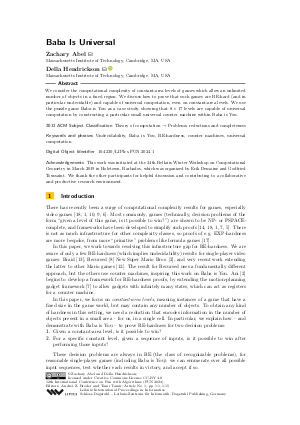Baba Is Universal
Authors
Zachary Abel,
Della Hendrickson 
-
Part of:
Volume:
12th International Conference on Fun with Algorithms (FUN 2024)
Part of: Series: Leibniz International Proceedings in Informatics (LIPIcs)
Part of: Conference: International Conference on Fun with Algorithms (FUN) - License:
 Creative Commons Attribution 4.0 International license
Creative Commons Attribution 4.0 International license
- Publication Date: 2024-05-29
File

PDF
LIPIcs.FUN.2024.1.pdf
- Filesize: 1.12 MB
- 15 pages
Document Identifiers
Subject Classification
ACM Subject Classification
- Theory of computation → Problems, reductions and completeness
Keywords
- Undecidability
- Baba is You
- RE-hardness
- counter machines
- universal computation
Metrics
- Access Statistics
-
Total Accesses (updated on a weekly basis)
0PDF Downloads0Metadata Views
Abstract
We consider the computational complexity of constant-area levels of games which allow an unlimited number of objects in a fixed region. We discuss how to prove that such games are RE-hard (and in particular undecidable) and capable of universal computation, even on constant-area levels. We use the puzzle game Baba is You as a case study, showing that 8×17 levels are capable of universal computation by constructing a particular small universal counter machine within Baba is You.
Cite As Get BibTex
Zachary Abel and Della Hendrickson. Baba Is Universal. In 12th International Conference on Fun with Algorithms (FUN 2024). Leibniz International Proceedings in Informatics (LIPIcs), Volume 291, pp. 1:1-1:15, Schloss Dagstuhl – Leibniz-Zentrum für Informatik (2024)
https://doi.org/10.4230/LIPIcs.FUN.2024.1
BibTex
@InProceedings{abel_et_al:LIPIcs.FUN.2024.1,
author = {Abel, Zachary and Hendrickson, Della},
title = {{Baba Is Universal}},
booktitle = {12th International Conference on Fun with Algorithms (FUN 2024)},
pages = {1:1--1:15},
series = {Leibniz International Proceedings in Informatics (LIPIcs)},
ISBN = {978-3-95977-314-0},
ISSN = {1868-8969},
year = {2024},
volume = {291},
editor = {Broder, Andrei Z. and Tamir, Tami},
publisher = {Schloss Dagstuhl -- Leibniz-Zentrum f{\"u}r Informatik},
address = {Dagstuhl, Germany},
URL = {https://drops.dagstuhl.de/entities/document/10.4230/LIPIcs.FUN.2024.1},
URN = {urn:nbn:de:0030-drops-199093},
doi = {10.4230/LIPIcs.FUN.2024.1},
annote = {Keywords: Undecidability, Baba is You, RE-hardness, counter machines, universal computation}
}
Author Details
Acknowledgements
This work was initiated at the 34th Bellairs Winter Workshop on Computational Geometry in March 2019 in Holetown, Barbados, which was organized by Erik Demaine and Godfried Toussaint. We thank the other participants for helpful discussion and contributing to a collaborative and productive research environment.
References
-
Greg Aloupis, Erik D. Demaine, Alan Guo, and Giovanni Viglietta. Classic Nintendo games are (computationally) hard. Theoretical Computer Science, 586:135-160, 2015.

-
Hayashi Ani. Unsimulability, Universality, and Undecidability in the Gizmo Framework. PhD thesis, Massachusetts Institute of Technology, 2023.

-
Hayashi Ani, Sualeh Asif, Erik D. Demaine, Jenny Diomidov, Della Hendrickson, Jayson Lynch, Sarah Scheffler, and Adam Suhl. PSPACE-completeness of pulling blocks to reach a goal. Journal of Information Processing, 28:929-941, 2020.

-
Hayashi Ani, Jeffrey Bosboom, Erik D. Demaine, Jenny Diomidov, Della Hendrickson, and Jayson Lynch. Walking through doors is hard, even without staircases: Proving PSPACE-hardness via planar assemblies of door gadgets. In 10th International Conference on Fun with Algorithms (FUN 2021). Schloss Dagstuhl-Leibniz-Zentrum für Informatik, 2020.

-
Hayashi Ani, Lily Chung, Erik D. Demaine, Jenny Diomidov, Della Hendrickson, and Jayson Lynch. Pushing blocks via checkable gadgets: PSPACE-completeness of Push-1F and Block/Box Dude. In 11th International Conference on Fun with Algorithms (FUN 2022). Schloss Dagstuhl-Leibniz-Zentrum für Informatik, 2022.

-
Jeffrey Bosboom, Josh Brunner, Michael Coulombe, Erik D. Demaine, Della Hendrickson, Jayson Lynch, and Elle Najt. The Legend of Zelda: The complexity of mechanics: Discrete and computational geometry, graphs, and games. Thai Journal of Mathematics, 21(4):687-716, 2023.

-
Erik D. Demaine, Della Hendrickson, and Jayson Lynch. Toward a general complexity theory of motion planning: Characterizing which gadgets make games hard. In 11th Innovations in Theoretical Computer Science Conference (ITCS 2020). Schloss Dagstuhl-Leibniz-Zentrum für Informatik, 2020.

-
Erik D. Demaine, Justin Kopinsky, and Jayson Lynch. Recursed is not recursive: A. jarring result. In 31st International Symposium on Algorithms and Computation (ISAAC 2020). Schloss Dagstuhl-Leibniz-Zentrum für Informatik, 2020.

-
Erik D. Demaine, Joshua Lockhart, and Jayson Lynch. The computational complexity of Portal and other 3D video games. In 9th International Conference on Fun with Algorithms (FUN 2018). Schloss-Dagstuhl-Leibniz Zentrum für Informatik, 2018.

-
Erik D. Demaine, Giovanni Viglietta, and Aaron Williams. Super Mario Bros. is harder/easier than we thought. In 8th International Conference on Fun with Algorithms (FUN 2016). Schloss Dagstuhl-Leibniz-Zentrum für Informatik, 2016.

-
Jonathan Geller. Baba is You is undecidable. arXiv preprint arXiv:2205.00127, 2022.

-
MIT Hardness Group, Hayashi Ani, Erik D. Demaine, Holden Hall, Ricardo Ruiz, and Naveen Venkat. You can't solve these Super Mario Bros. levels: undecidable Mario games. In 12th International Conference on Fun with Algorithms (FUN 2024). Schloss Dagstuhl-Leibniz-Zentrum für Informatik, 2020.

-
Linus Hamilton. Braid is undecidable. arXiv preprint arXiv:1412.0784, 2014.

-
Robert A. Hearn and Erik D. Demaine. Games, Puzzles, and Computation. CRC Press, 2009.

- Ivan Korec. Small universal register machines. Theoretical Computer Science, 168(2):267-301, November 1996. URL: https://doi.org/10.1016/S0304-3975(96)00080-1.
-
Walter J. Savitch. Relationships between nondeterministic and deterministic tape complexities. Journal of computer and system sciences, 4(2):177-192, 1970.

-
Matthew Stephenson, Jochen Renz, and Xiaoyu Ge. The computational complexity of Angry Birds. Artificial Intelligence, 280:103232, 2020.

-
Giovanni Viglietta. Gaming is a hard job, but someone has to do it! Theory of Computing Systems, 54:595-621, 2014.

